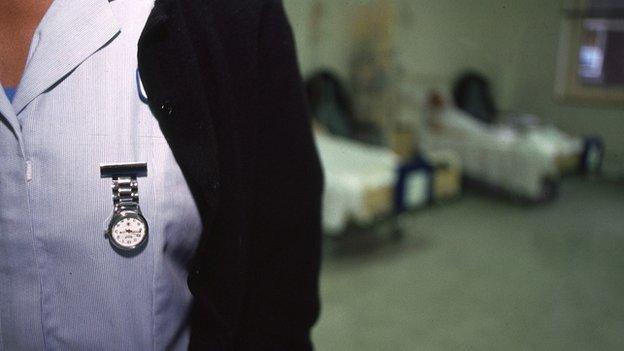Tough at the top – does the NHS need a leadership shake-up?
- Published

It's a big organisation, one of the biggest in the world in staff numbers behind the US Defence Department, the Chinese People's Liberation Army, Walmart and McDonalds. So the leadership of the National Health Service really matters.
And don't forget there is an annual budget totalling more than £100 billion. An interesting report today suggests that there are too many senior positions to fill, not enough good managers and that NHS leadership is "in crisis".
A panel of the great and the good in the health world was convened by Health Service Journal to look at the future of NHS leadership and chaired by Sir Robert Naylor, chief executive of University College London Hospitals NHS Foundation Trust. It focussed on the NHS in England which itself employs as many people as the Indian armed forces.
Their report states that one in three trusts has board level vacancies and there is no finance director at one in five hospitals.
The panel argues that the political landscape is changing, public scrutiny is intense and there are big demands on trusts as resources are squeezed. Senior managers are now expected to manage relationships with private providers and social care groups in addition to the requirements of their own organisations.
Red tape

So what's the answer? The panel says there are too many organisations and layers of bureaucracy throughout the NHS. Sir Robert noted there were about 800 chief executive posts which needed to be filled, which was excessive. Reduce the number of these organisations, he argued, and the current pool of talented leaders can be spread more evenly.
The other key conclusion is that not enough clinicians have been encouraged to take on senior management roles and that such positions have not been made to look attractive enough. Sir Robert told the Today programme that many consultants felt they were better off as they were, with the opportunity to augment their earnings with lucrative private work and without the risk of failure associated with managing trusts in difficulty. So "the correct remuneration package" might be needed to incentivise doctors to take on leadership posts.
The direction of travel is towards pooling of expertise. The Health Secretary Jeremy Hunt said in a recent speech to NHS senior managers that "hospital chains" should share best practice developed by the highest performing Foundation Trusts. His recent utterances on the subject of pay of NHS chiefs, however, do not suggest any great sympathy to the idea of boosting their remuneration packages.
The Government has commissioned its own review of NHS leadership by Lord Rose, former boss of Marks & Spencer. That was more than a year ago and the report appeared to be sitting in very long grass when the election campaign got underway. The opposition claimed that Lord Rose was suggesting that the Government's own health reforms had made the job of management harder. The Whitehall line is that he was asked to spend longer than originally expected on the report because of the publication of the Five Year View by NHS England in October 2014 setting out the vision for the future of the NHS.
The Rose report, it seems, will be published soon. Whether it's a technocratic piece of work or a wider-ranging critique of leadership in the health service remains to be seen. The Health Service Journal panel has certainly raised the profile of the issue and set out the case for reform.
- Published11 June 2015

- Published31 May 2015
